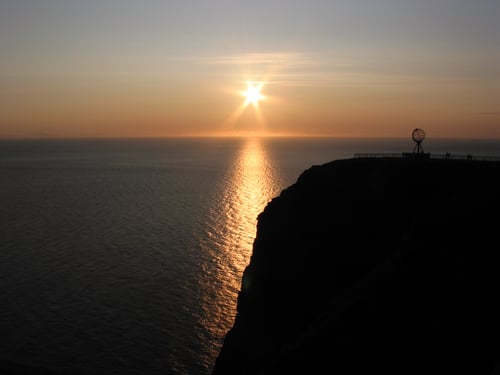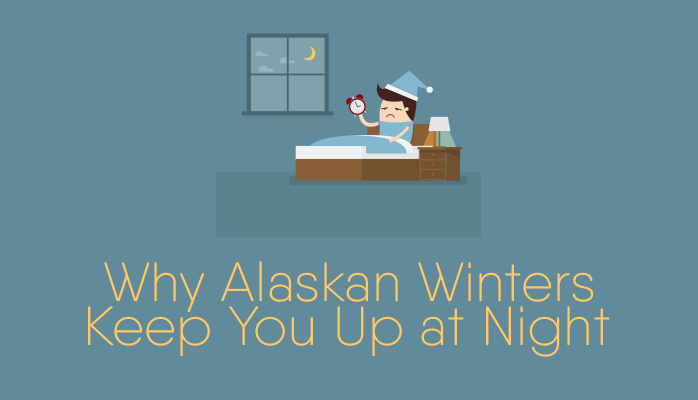Different Ways Alaska’s Extreme Lighting Conditions Affect Life
Other than a few months out of the year between “spring” and “fall” in Alaska, living here poses unique sleeping related to either receiving mostly (or only) daylight or mostly (or only) darkness. These extreme lighting conditions affect our lives in many different ways, most of which can be very disruptive towards sleep.
Extreme light conditions in Alaska can provides challenges that are:
- Sociological
- Psychological
- Physiological
- Habitual
Let’s face it, nearly everyone is a different in winter and summer. It’s why you might sometimes hear the quip, “Living in Alaska means being two people.” Especially in the long winter nights here, our physical and social habits change, many of us have mental or emotional responses to the total darkness, and our behavior changes as well.
How Long Days of Darkness Cause Sleep Disruption in Alaska
 When this is the most sun you might get all day, it throws circadian rhythms off
When this is the most sun you might get all day, it throws circadian rhythms off
Unfortunately, negative responses to winter often end up either exacerbating or causing the onset of sleep disorders, such as:
- Circadian rhythm disorders
- Insomnia
Insomnia is the persistent feeling that cannot get to sleep, say asleep throughout the night, or are waking up much earlier than you want. Circadian rhythm disorders are a family of sleep disorders affecting the timing of sleep (i.e., disorders affecting your “biological clock”).
Either way, the result is less sleep, and perhaps more tiredness. It’s counter intuitive that a long, dark, cold day could contribute to or worsen a sleeping disorders like insomnia or circadian rhythm disorders.
However, our ability to have a healthy biological clock and sleep pattern is largely regulated by external cues that are much harder to acquire in the long, dark Alaskan winters:
- Changes from light to dark – melatonin is a light sensitive hormone that regulates sleep
- Exercise
- Being outdoors
- Maintaining positive sense of well-being (seasonal depression is very real for many people)
- Normal routines and cues before bed
Long story short, maintain a healthy biological clock requires a lot more effort during the winter that if unmanaged can easily lead to a wonky sleep schedule. And in all cases of talking about a “wonky sleep schedule” we are really talking about a “sleep deprived sleep schedule.”
Symptoms of Darkness Induced Sleep Disorders in Alaska
There are some hallmark symptoms that you are suffering from a sleeping disorder that is either included or exacerbated by the long, dark days. The obvious symptom is trouble sleeping or the cognizant awareness that you are not getting as much sleep as you need.
Beyond this, other periphery symptoms include [SleepEducation]:
- General performance loss in many important areas of life (work, relationships, etc.)
- Chronic daytime fatigue
- Being unable to stay awake during the day
- Sudden onset of sleep-readiness at an odd hour during the day
- Memory trouble
- Concentration problems
- Brain fog
- Headaches
- Anxiety
- Depression
- Mood troubles
These facts, coupled with the awareness that you are not getting the requisite hours of sleep, may require you to try and mitigate your sleep difficulties.
How to Deal With Darkness and Sleep Deprivation in Alaska
Many Alaskans use light therapy with great success in combatting sleep disorders during the winter. This involves turning on a bright, light therapy lamp in the morning when you wake up and turning it off in the evening about 12 hours later.
Having a strict bedtime routine can help you cultivate the cues that prompt the secretion of melatonin. This could include a bath before bed, certain smells (i.e. essential oils), and a specific activity, such as reading.
Ensuring that you have a restful bedroom is likewise extremely important. This means having a policy about media use in the bedroom, removing your TV and other sources of blue light or distraction, and ensuring your room is quiet and comfortable.
Consulting with a sleep specialist to express concerns, difficulties, or seek further guidance is also an extremely effective way of ensuring that your sleep preparation is curtailed to your unique sleep struggles.


